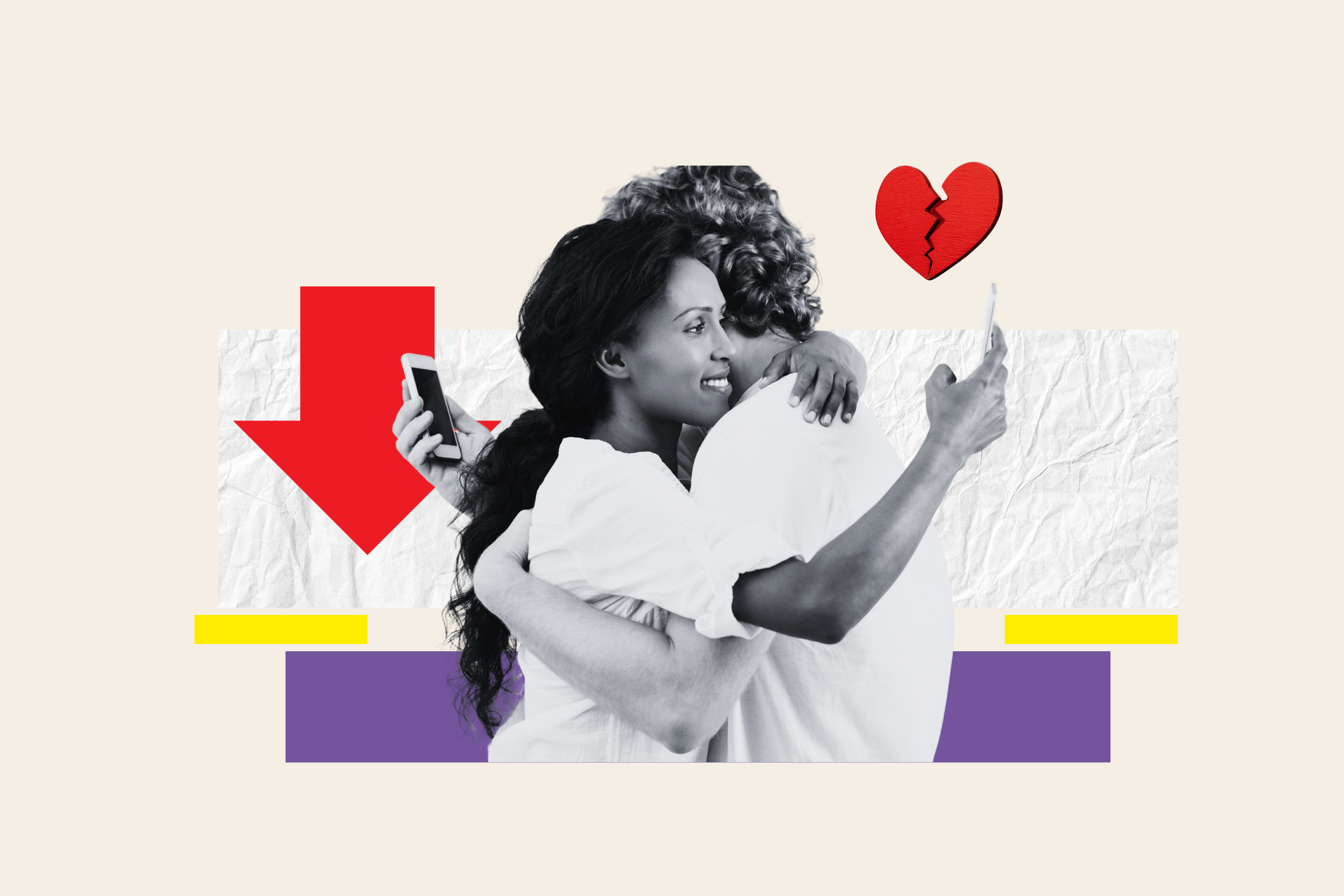
Smartphones have long become indispensable tools for communication, entertainment, and work. But for many millennials, their constant presence is proving to be more harmful than helpful—especially when it comes to relationships.
Relationship app Paired surveyed 1,561 people to understand exactly how phones—along with other technologies—are interfering with respondents’ love lives.
Of the majority of millennials (aged 29 to 44) it surveyed, 15.7 percent said technology creates distance in their relationships, while 9.7 percent reported that it had become a source of conflict.
Photo Illustration by Newsweek/Getty Images
The data highlights an issue that relationship experts have been warning about for years: technology is reshaping how couples interact, and not always for the better.
“It is no surprise that so many couples feel like phones are negatively impacting their relationships,” Aly Bullock, a therapist and Paired’s Head of Relationships, told Newsweek. “The data really highlights what I see in my work all the time—technology, when used without clear boundaries or a specific purpose, makes it harder for couples to feel truly connected.”
Era of ‘Technoference’
Dr. Martha Dieros Collado, a clinical psychologist, also weighed in on the issue through a recent Instagram video, where she discussed a new term known as “technoference”—the way in which technology disrupts interpersonal relationships.
She told viewers online that the phenomenon has become more insidious since the rise of smartphones.
“We often miss how rude it is to not be present with those around us,” Collado, who is known as @dr.martha.psychologist on Instagram, wrote in the post’s caption. “Most of us have built bad habits with our phones and just accept the status quo, but maybe we shouldn’t have to?”
Dr. Dieros Collado outlined simple but effective strategies to counteract these habits, such as setting clear expectations on when phones are allowed or not allowed at home and keeping phones out of reach during social gatherings.
“This sounds easy, but it won’t be if it’s new or unfamiliar,” she shared in the post. “You may need to work harder at coping with uncomfortable emotions—boredom, stress, or even excitement—before your phone is no longer a crutch.”
Newsweek reached out to @dr.martha.psychologist via email for more information.
But Are Phones the Only Issue?
While Paired’s study found that 64.3 percent of respondents had experienced problems due to phone use during quality time together, 24.9 percent said that social media behavior had caused issues too.
“Social media adds another layer of tension because of the comparison factor,” Bullock said. “You start comparing your relationship to relationships you see online, or wish your partner would do the thing this influencer does.
“Maybe you just start to stress that your partner is lazy because they are sending you reels when they are supposed to be working.”
Even when phones are not in use, their mere presence can be damaging. A 2012 study by Przybylski and Weinstein found that just having a phone nearby—even if it’s not being used—can make conversations feel less intimate.
“This happens because we know our partner could be distracted at any moment, making it harder to fully open up and connect,” Bullock said.
In some cases, the impact of technology on intimacy is even more intrusive.
“One couple I worked with were fighting because his Apple Watch kept vibrating during sex, and she was so turned off,” Bullock added. “This is a perfect example of how pervasive the effects of technology are on relationships.”
Beyond interruptions and comparisons, the poll revealed other troubling trends.
44 percent of respondents admitted they lacked quality time with their partner, while 28.9 percent said they were currently struggling to have difficult conversations. Of the people surveyed, 10 percent admitted turning to AI tools for relationship advice.
While the findings nod to phones having a damaging impact on millennial relationships, Bullock says that modern romances are still salvageable if couples can adapt. For couples looking to reclaim their time together and set healthy boundaries around screentime, Bullock suggests small but impactful changes.
“If you are going to be on your phone anyway, at least engage with something that shows your partner, ‘I love you and I’m thinking about you,’ like answering Paired’s daily question,” she said. “If you do this, they will not be so mad when you take your phone to the bathroom with you.”
Ultimately, technology does not appear to be the enemy—but its unchecked use can, according to the new data, weaken relationships.
“Instead of trying to control each other’s phone use, couples can navigate this by expressing how tech is impacting their relationship security as a whole,” Bullock said. “Discussing how they can work as a team to mitigate its effects is key.
Have you noticed any red flags that made you end a relationship? Let us know via life@newsweek.com. We can ask experts for advice, and your story could be featured on Newsweek.
